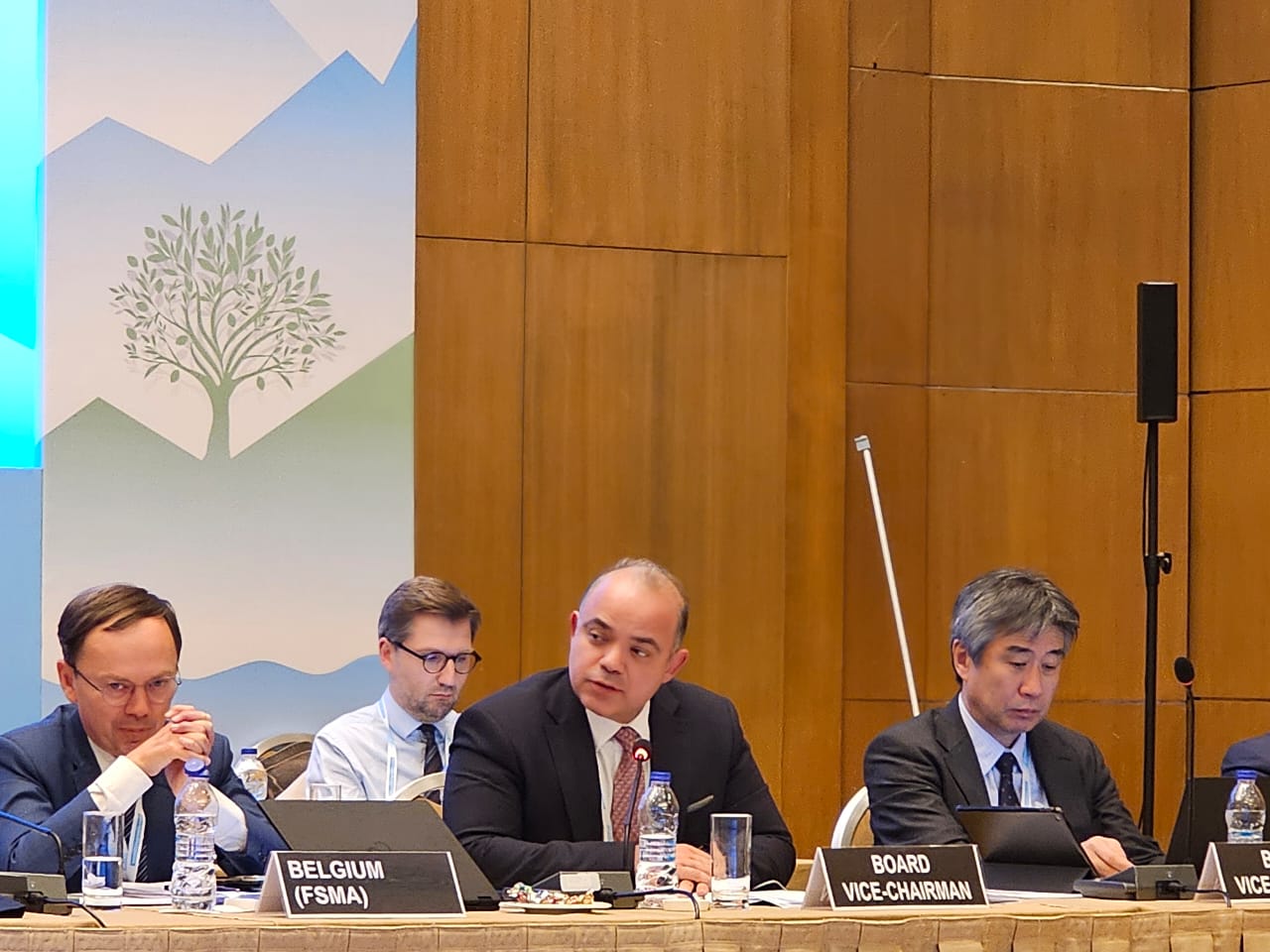- FRA’s Chairman attends signing of a MoU involving Paraguay, India, South Africa, and Guernsey.
- Mohamed Farid emphasizes that sharing knowledge through IOSCO improves capital markets, ultimately benefiting economic development
- There’s a growing need to invest in building expertise and offering technical assistance to finance climate solutions
Dr. Mohamed Farid- FRA’s Chairman and Chair of the IOSCO’s Growth and Emerging Markets Committee (GEMC) participated in the 49th IOSCO Annual Meeting in Greece under the slogan “Climate in the center of Economy”. He attended the annual meeting of IOSCO’s Board of Directors and witnessed signing of memorandums of understanding involving Paraguay, India, South Africa, and Guernsey.
The rest of the week at the IOSCO annual meetings will be packed with one-on-one meetings, informative talks, and focused discussions. These sessions will tackle key issues that are crucial for developing strong capital markets and boosting their contribution to economic growth. Sustainable finance, financial technology, carbon markets, and building expertise will all be major topics of the sessions

Dr. Farid highlighted that the IOSCO meetings have addressed key areas for capital markets. These include fostering development alongside strong oversight, integrating efforts for financial stability, promoting sustainable finance activities, and creating regulations for the evolving financial technologies within capital markets.
The IOSCO’s Board of Directors reviewed updates from key financial working groups. Financial Stability Engagement Group (FSEG) provided a progress report, in addition to the Committee on Emerging Risks (CER) which offered a summary of their private financing survey and the Fintech Task Force (FTF) shared an update on their activities.
IOSCO’s Board of Directors also delved into sustainable finance, specifically the work of the Glasgow Financial Alliance for Net Zero (GFANZ). This alliance brings together various initiatives aimed to achieve net-zero emissions across all financial systems. Their ultimate goal is to accelerate the shift towards zero carbon emissions by 2050, or even sooner.
Dr. Farid praised the Glasgow Financial Alliance for Net Zero (GFANZ). He highlighted how the Alliance unites key players in climate finance capacity building, including designers, providers, funders, and beneficiaries. This fosters collaboration, maximizes accessibility and inclusivity, and provides essential support like technical assistance, training, knowledge sharing, and research. This aligns perfectly with the goals of the UN and G-20, and even strengthens the capacity-building efforts of GFANZ’s regional networks in their pursuit of net-zero emissions.
Dr. Farid emphasized the importance of IFRS sustainability reporting standards. These standards which are adopted by the IOSCO aiming to improve transparency. The first standard, IFRS S1, focuses on general requirements for disclosures of Sustainability-related Financial Information , while the second, IFRS S2, specifically requiring entities to provide information about climate-related risks and opportunities.
In the meeting, Dr. Farid presented the Authority’s efforts on various initiatives, decisions, laws, and resulting regulations and procedures that helped set the stage for the first voluntary carbon market.
Dr. Farid emphasized collaboration between FRA and other stakeholders to build a supportive environment for a thriving voluntary carbon market. This market would aid global efforts towards carbon neutrality. He highlighted the importance of training, knowledge sharing, and technical support to finance climate action effectively.
In addition, he highlighted that discussions within the IOSCO underline the importance of capital markets for economic growth. These markets offer a variety of investment and financing options for businesses, enabling them to expand, create jobs, and integrate sustainability practices. This includes considering environmental, social, and governance (ESG) factors and creating reports that meet international standards.
In the meeting, participants examined a report issued by a review group focused on a multilateral agreement. Their goal was to greenlight a compliance handbook and related processes that ensure a smooth rollout of the recommendations adopted by the Board last June.
In addition , Head of the Finance and Audit Committee (FAC) presented Finance Committee’s suggestions regarding the audited financial statements for 2023.
Dr. Farid, in his role as chair of GEMC, observed the signing of two agreements. The first was a new Multilateral Memorandum of Understanding (MoU) with the Central Bank of Paraguay. The second was an improved version of an existing MoU with the Guernsey Financial Services Commission, the International Financial Services Centers Authority (IFSCA) in India and the Financial Sector Conduct Authority (FSCA) in South Africa.
Egypt, represented by Dr. Mohamed Farid, FRA’s Chairman , won the post of GEMC Chairman (2024 to 2026) for the third consecutive time.
The GEMC is the dominant committee within the IOSCO. It encompasses over 75% of the organization’s membership, including major economies like the world’s fastest growing economies and 10 members of G20.
IOSCO plays a central role in setting the global rulebook for financial markets. It’s standards promote fair, transparent, and efficient markets, along with effective risk management. Almost all stock market regulators (around 95%) are members in the IOSCO.
Last modified: June 4, 2024
